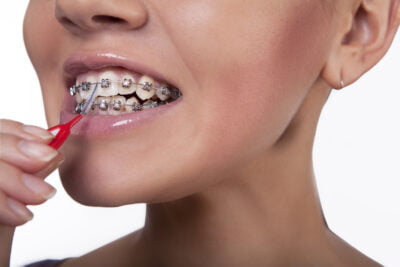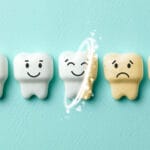There’s no way around it — a healthy mouth requires a daily routine of cleaning between teeth and around the gums. The most common way to do this is through brushing and flossing. But what if you find flossing problematic? Your Yuba City dentist may recommend an interdental cleaner as a practical alternative.
What is an Interdental Brush?
Interdental brushes are devices designed to reach the small gaps and crevices between teeth, or where the teeth meet the gums — places where normal toothbrushes cannot reach. These thin, round or cone-shaped brushes have a small bristled head that is much smaller than a normal toothbrush. The cleaning surface of the brush resembles a small pipe cleaner. The bristles are short and able to pass through very tight spaces. They are available with both coated and uncoated wire to accommodate a person’s specific needs.
Many proponents of interdental brushes find the use of the handle much easier than that of dental floss. The brushes come in different sizes, so you can choose the one that comfortably fits between your teeth. If there is varying space between your front and back teeth, you can even use different size brushes for different areas of your mouth.
The only areas they miss are the points at the top of the teeth and the space between your last molar and the gum. Nevertheless, clinical studies show that combined with a regular program of normal toothbrushing, interdental brushes are effective at reducing plaque and controlling gingivitis, and are a viable alternative to flossing.
Who Might Benefit
 Why do some find flossing so difficult? There are a variety of reasons, really. The following groups of people may benefit from using interdental cleaners:
Why do some find flossing so difficult? There are a variety of reasons, really. The following groups of people may benefit from using interdental cleaners:
People with limited mobility: Elderly or disabled persons may find an interdental brush easier to maneuver than dental floss.
People with braces: It is normally not possible for a person with braces to floss properly. Interdental brushes can be used as an alternative to remove food and plaque from between teeth.
People with large gaps between teeth: It is difficult to use floss to clean between large spaces between teeth, since the floss does not properly fill the gap. In this case, interdental brushes are much more effective.
People who hate flossing: There are those who simply dislike flossing, and refuse to do it. Since interdental brushes are easier to use, these persons may be more inclined to include them in their daily routine.
Oral Irrigators
Oral irrigation devices, also known as water jets, water picks or water flossers, may also be used as part of your interdental hygiene program. These devices normally use pressurized water to remove food particles from the interdental spaces, as well as from the pockets found below the gum. Although their popularity has varied over the years, studies show these devices can be used safely and effectively to dilute the acids produced by plaque.
When it comes to oral hygiene, brushing and flossing is still generally considered best practice. However, if flossing regularly is not an option, or you are at increased risk for dental or periodontal disease, interdental cleaners may be your best alternative.



